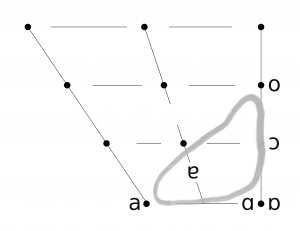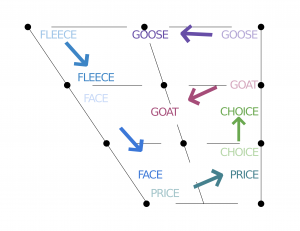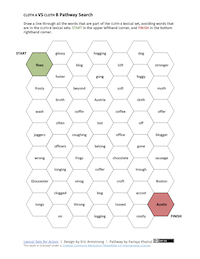4 The LOT Lexical Set
 The lot lexical set features words with so-called “short O”. The lot vowel is Checked, so it requires a following consonant, and is always stressed in its dictionary form. In many accents it is associated with an open back rounded vowel, such as /ɒ/.
The lot lexical set features words with so-called “short O”. The lot vowel is Checked, so it requires a following consonant, and is always stressed in its dictionary form. In many accents it is associated with an open back rounded vowel, such as /ɒ/.
On the other hand, lot is also frequently merged with the palm Lexical Set, as it is in many North American accents. palm can be Free, and is often associated with the fully-open unrounded vowel /ɑ/.
- ☑️ Checked: requires a following consonant, and cannot exist on its own
- in stressed syllables
Spellings
oC, occasionally aC
The vast majority of words within the lot set are spelled “o” before a consonant (C), or ‹oC› as in hop, nod, clock. Less common spellings in stressed syllables include: want, yacht, rendezvous, golf, acknowledge.
In some accents, the very commonplace words of, was, what, from, because are pronounced in their dictionary form with lot, while other accents, especially in North America, have these words as part of strut.
Pronunciations
The lot lexical set is pronounced with an open back vowel with a range of roundness. Frequently it’s [ɒ], with variations in the range of [ɑ~ɒ~ɔ] in the vast majority of mainstream accents of English. lot can merge with:
- thought, which is likely to be more close/rounded, and/or
- palm, which is less rounded and possibly more front, and/or
- cloth, which has no effect on pronunciation.
In parts of the Caribbean there are some instances where lot is fronted to the point where it has merged with trap.
In accents where lot in unrounded, but still distinct from palm (which is also unrounded), the distinction is mainly around the length of the vowel, rather than its quality, though some may have palm more fronted [a] than lot [ɑ]. This is heard in many North American Englishes, Irish English, the West Country and West Midlands of the UK.

For Englishes with a very high (close) thought vowel in the ranɡe of [o], lot can move up into the range of [ɔ], through a process known as a chain shift. In contemporary Standard British English, lot is now higher (more close) than it was in traditional Received Pronunciation. Alternately, lot can shift to the front of the mouth, with [a] the most common example, as we see in the Inland North of the US.
Many second-language (L2) speakers of English lack an [ɒ] vowel in their first-language (L1) vowel system; in almost all of these cases, the tendency is to substitute their /o/, which may sit in the ranɡe of [o~ɔ]. L2 speakers may use spelling pronunciations for words with spellings other than ‹o›, especially in languages where spelling and pronunciation are more directly linked than in English.
Personal Pronunciation
Let’s explore your personal pronunciation of lot. But first, let’s see whether you have a merger with any of the possible candidates: cloth, thought, or palm. Note that many palm words may be distributed to other lexical sets in your particular accent. It might be worth exploring your pronunciation of each column to see if they actually match one another. Note that cloth will be merged with lot or thought, both, or even all three other sets!
| lot | cloth | thought | palm |
| bot | broth | brought | bra |
| cot | cost | caught | calm |
| jock | joss stick | jaw | Java |
| flock | froth | fought | father |
For more examples of each set, see cloth, thought, palm.

 Experiment on your own with an audio recorder, or with a classmate, friend, coach or teacher to identify how your lot vowel compares with others. Try extending the sound of your lot vowel, and then attempt to subtly shift it around in the vowel space—up, forwards, down, and back—in tiny increments. As it is an open back vowel, you should feel the top surface of your tongue moving towards/away from your soft palate and uvula, making more or less space in the back of your mouth. Also explore the degree of lip rounding you use with lot. Use a mirror to see if you round your lips at all, or to what degree you do it. Compare a palm word with lot to see if you can feel a difference in the shape of the vowels. What’s the smallest noticeable change that you can make?
Experiment on your own with an audio recorder, or with a classmate, friend, coach or teacher to identify how your lot vowel compares with others. Try extending the sound of your lot vowel, and then attempt to subtly shift it around in the vowel space—up, forwards, down, and back—in tiny increments. As it is an open back vowel, you should feel the top surface of your tongue moving towards/away from your soft palate and uvula, making more or less space in the back of your mouth. Also explore the degree of lip rounding you use with lot. Use a mirror to see if you round your lips at all, or to what degree you do it. Compare a palm word with lot to see if you can feel a difference in the shape of the vowels. What’s the smallest noticeable change that you can make?
Decide which vowel symbol best suits your lot Lexical Set. Is it [ɒ, ɑ, ɔ, o], or even [a] or [æ]?
If your lot vowel is… (use which ever vowel symbol is appropriate for you)
- high, use the raised diacritic [ ɒ̝ ], a small T pointing up
- open, use the lowered diacritic [ ɒ̞ ], a small T pointing down
- pushed forward, use the advanced diacritic [ ɒ̟ ], a tiny plus sign +
- pulled back, use the retracted diacritic [ ɒ̠ ], a tiny minus sign –
- moved toward the middle of the mouth, towards schwa [ə], use the mid-centralized diacritic [ ɒ̽ ], a tiny x-marks-the-spot above the symbol,
- if you add lip-rounding, use the more rounded diacritic [ ɒ̹ ], a tiny ɔ, which represents the lips rounding forward (to the left),
- if you have no lip̤̤-rounding, especially on a symbol assumed to be rounded like [ɒ, ɔ, o], use the less rounded diacritic [ ɒ̜ ], a tiny c, which represents the lips moving back (to the right).
Alternate Pronunciations
Experiment with the lot Word Lists, Phrases and Sentences with the following vowels:
As you move the vowels in the directions recommended, see whether that modified oral posture might inspire you to move the articulation of consonants and other vowels in the word in similar ways. Does it remind you of an accent other than your own?
Word Lists for lot, sorted by the consonant that follows
KEY: ◾︎lot in stressed syllable ◽︎ lot in unstressed syllable
PLOSIVES
-p
-b
-t
-d
-k
-ɡ
AFFRICATES
-tʃ
-dʒ
NASALS
-m
-n
-ŋ
FRICATIVES
Most Voiceless Fricatives after ‹o› are cloth Ⓐ or Ⓑ
-θ
-ð
-f
-v
-s
-z
-ʃ
-ʒ
APPROXIMANTS
For lot followed by /-rV/, see cloth; for lot followed by /-rC/ see north (and possibly force).
lot before /l/ can be affected by the following consonant; the vowel is often pulled back, especially if /l/ is articulated with the dark-l [ɫ], which may move the vowel more towards [ɔ] which is often the sound of thought, (especially if it is distinct from lot).
 In order to practice these vowels without the following consonant affecting them, experiment with the “Consonant Chop” technique. Speak the word without the following consonant and all that comes after it, chopping the word off right after the lot vowel. For example, for dollar, you would start by saying “do-“ then, as two units, say “do- -llar”. If you’re working on using the [ɒ] vowel, that would be [dɒ—lɚ]. Then try putting the two syllables closer and closer together, [dɒ – lɚ, dɒ – lɚ, dɒ. lɚ, ˈdɒlɚ]. You could also try a different vowel, say [a], and change the /ɚ/ to [ə] [da – lə, da – lə, da. lə, ˈdalə].
In order to practice these vowels without the following consonant affecting them, experiment with the “Consonant Chop” technique. Speak the word without the following consonant and all that comes after it, chopping the word off right after the lot vowel. For example, for dollar, you would start by saying “do-“ then, as two units, say “do- -llar”. If you’re working on using the [ɒ] vowel, that would be [dɒ—lɚ]. Then try putting the two syllables closer and closer together, [dɒ – lɚ, dɒ – lɚ, dɒ. lɚ, ˈdɒlɚ]. You could also try a different vowel, say [a], and change the /ɚ/ to [ə] [da – lə, da – lə, da. lə, ˈdalə].
-l/ɫ
Short Phrases
- It’s not hot out
- Logical, methodical economics
- My watch says it’s 3 o’clock
- Foggy cognition
- The waddling toddler
- Adopt the frog
- Pop makes Robbie vomit.
- Driven* to distraction
- Monitor your connectivity
- The model body-builder.
- Roxanne is Scottish.
- Donny Osmond is a doll.
- John was seconded to Operations.
- Copyright law is not popular.
- Bonnie is bonding with Robin.

Sentences
Level 1
Short with 2-3 words, underlined
- We’ve got options with the stock exchange.
- Roger didn’t bother to use scotch-tape.
- Oliver polished the bomb.
- Rosalind isn’t posh: she’s from the provinces.
- The object of Otto’s gossip.
Level 2
Short with 4-5 words, underlined
- Rob was noshing on an omlette in his Honda.
- The Brontës played hopscotch and pingpong in Bosnia.
- Todd mocked him for spilling his scotch on his crotch.
- Doctor Spock was obviously very pompous.
- “Gosh, Batman, Gotham is shockingly smoggy,” said Robin.
Level 3
Medium with 3-4 words, not underlined
- Six frosh caught botulism from eating spoiled lobster.
- Are lox and pork chops a good combination?
- I unboxed my Compaq laptop when I got to Oxford.
- Oz has lots of intolerably jolly Lollipop Guild members.
- The Potsdam pickpocket stole my pocket watch.
Level 4
Hard with 4-6 words, not underlined
- Wisconsin’s La Crosse County is the best spot for Fall leaf watching.
- Rockhampton is on the Tropic of Capricorn so it’s pretty hot.
- Scott and Polly moved to Cochrane Ontario in October.
- The economy of Nunavut’s Pond Inlet is focused on contracts that stock the co-op.
- Put the cod in the bottom of the pot and add soup stock on top.
Mergers
lot–thought Merger: Also known as the “cot-caught merger,” heard in Canada, Scotland, and a range of other accents in the US, including Northeastern New England, some regions of the South and West. This means that words like bobble/bauble, body/bawdy, chock/chalk, don/dawn, not/naught are pronounced similarly. If you have this merger, then try to differentiate the lot and thought words in this sentence; if you do not have it, try to match them! Experiment with lot/thought pairs such as [ɒ/ɔ, a/ɒ, ɑ/ɒ̝, ɔ/o, ɑ̟/ɔə̯].
-
- Polly and Paul were awed by the odd fox named Faukes.
- As I was walked into the Honda Store, in Vaughan, I received a compliment on my watch.
- The unauthorized bank charges came from a popular restaurant that I have not gone to yet.
- Samantha taught her daughter to speak Tagalog at home, so her heritage is not forgotten.
Note that thought has a subset, sometimes known as the salt set, which features words with ‹alC› or ‹aulC› such as false, vault; for speakers with the lot–salt merger, these words are merged with lot, even if the remainder of thought is not. Experiment with having the salt words below match with the lot words, or with the thought words with lot/thought pairs such as [ɒ/ɔ, a/ɒ, ɑ/ɒ̝, ɔ/o, ɑ̟/ɔə̯].
Although the bald man forgot he dropped the ball, it was not his fault,
so he fought for a modest fall from grace.
palm-lot Merger: Also known as the “father-bother merger,” where lot merges with palm, as is found in African American English and many forms of Southern US English, and in the speech of County Cork and County Kerry in Ireland. Examples of Father-Bother (near) homophones: Mach/mock, bomb/balm, comms/calms, doll/dal*, pompom/palm. If you have this merger, then try to differentiate the lot and palm words in this sentence; if you do not have it, try to match them! Experiment with lot/palm pairs such as [ɒ/ɑ, a/ɑ, ɒ̝/ɒ̞, ɔ̞/ɑ, ɑ̟/ɑ̠].
-
- If Bollywood made a movie in Bali, would James Caan play a con man in it?
- Commonly, an Imam’s job in Islam lead prayers and sermons, called Khutbah.
- Amaan owns a popular shop in Pakistan that sells the best nihari.
- Leo made an objective to learn an impossible piano sonata to impress their crush, Kamala.
trap-lot Merger: Found in some accents of the West Indies, such as Jamaica, Guyana and the Leeward Islands. When it occurs in these varieties, the vowel is likely to be a front vowel in the range of [a]; some of the varieties also merge with thought, bath, and/or palm as well. Examples of trap-lot homophones: tap/top, Dan/don, jabs/jobs, shat/shot, lack/lock, adapt/adopt, sang/song. If you have this merger, then try to differentiate the trap and lot words in this sentence; if you do not have it, try to match them! Experiment with trap/lot pairs such as [a/ɒ, æ/ɑ, ɛ̞/ɒ̝, a̠/ɔ̞].
-
The shock I felt being in the shack stopped when you sang the song with Dan and Don.
- Diego wrote a novel about time travel where the protagonist got trapped in an alternative dimension.
- Natalia had to block some of her followers because they were either inactive or bots.
- We got plans for the new model of the Apple AirPods and iPad.
Review
Pathway Puzzles

Pathway Puzzles allow you to practice finding members of a lexical set. Choose the next cell with the FIRST lexical set word to make a pathway from the START of the puzzle down to the FINISH. Open the KEY document to see the solution, and check your work. Pathway Puzzles were created by Farisya Khairul, through support from a AMPD Minor Research Grant.
lot–thought Pathway Puzzle | KEY
thought–lot Pathway Puzzle | KEY
cloth Ⓐ – lot Pathway Puzzle | KEY
A phonological change within an accent where a phoneme moves into the space vacated by another phoneme that has already moved. These can include multiple items as moving in concert. There are two sorts of "chain shifts", push shifts, and drag/pull shifts.
A pronunciation based on the spelling of the word rather than its traditional pronunciation. For L2 speakers, this may be associated with the spelling/pronunciation traditions of their L1 language.

